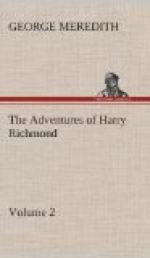‘Temple,’ said I, dissembling a little; ’I tell you candidly: you won’t please me by doing anything disagreeable to you. A dog pulled by the collar is not much of a companion. I start for Julia to-morrow before daylight. If you like your bed best, stop there; and mind you amuse Janet for me duing my absence.’
‘I’m not going to let any one make comparisons between us,’ Temple muttered.
He dropped dozens of similar remarks, and sometimes talked downright flattery, I had so deeply impressed him.
We breakfasted by candle-light, and rode away on a frosty foggy morning, keeping our groom fifty yards to the rear, a laughable sight, with both his coat-pockets bulging, a couple of Riversley turnover pasties in one, and a bottle of champagne in the other, for our lunch on the road. Now and then, when near him, we galloped for the fun of seeing him nurse the bottle-pocket. He was generally invisible. Temple did not think it strange that we should be riding out in an unknown world with only a little ring, half a stone’s-throw clear around us, and blots of copse, and queer vanishing cottages, and hard grey meadows, fir-trees wonderfully magnified, and larches and birches rigged like fairy ships, all starting up to us as we passed, and melting instantly. One could have fancied the fir-trees black torches. And here the shoulder of a hill invited us to race up to the ridge: some way on we came to crossroads, careless of our luck in hitting the right one: yonder hung a village church in the air, and church-steeple piercing ever so high; and out of the heart of the mist leaped a brook, and to hear it at one moment, and then to have the sharp freezing silence in one’s ear, was piercingly weird. It all tossed the mind in my head like hay on a pitchfork. I forgot the existence of everything but what I loved passionately,—and that had no shape, was like a wind.
Up on a knoll of firs in the middle of a heath, glowing rosy in the frost, we dismounted to lunch, leaning against the warm saddles, Temple and I, and Uberly, our groom, who reminded me of a certain tramp of my acquaintance in his decided preference of beer to champagne; he drank, though, and sparkled after his draught. No sooner were we on horseback again—ere the flanks of the dear friendly brutes were in any way cool— than Temple shouted enthusiastically, ’Richie, we shall do it yet! I’ve been funking, but now I’m sure we shall do it. Janet said, “What’s the use of my coming over to dine at Riversley if Harry Richmond and you don’t come home before ten or eleven o’clock?” I told her we’d do it by dinner-time: Don’t you like Janet, Richie?—That is, if our horses’ hic-haec-hocks didn’t get strained on this hard nominative-plural-masculine of the article road. Don’t you fancy yourself dining with the captain, Richie? Dative huic, says old Squire Gregory. I like to see him at dinner, because he loves the smell of his wine. Oh! it’s nothing to boast of, but we did drink them under the table, it can’t be denied. Janet heard of it. Hulloa! you talk of a hunting-knife. What do you say to a pair of skates? Here we are in for a frost of six weeks. It strikes me, a pair of skates . . .’




